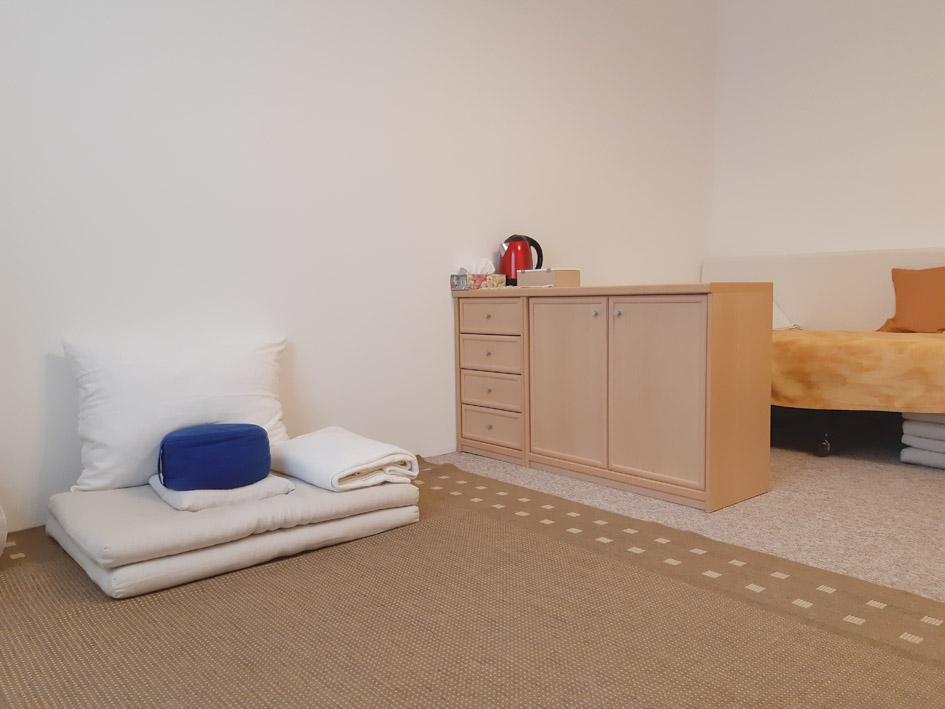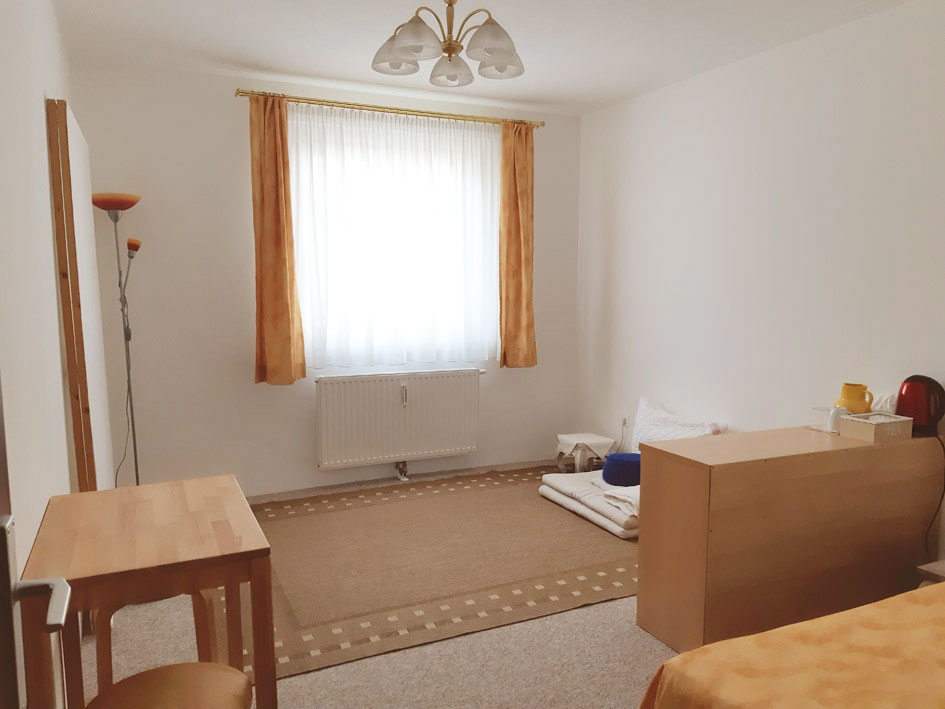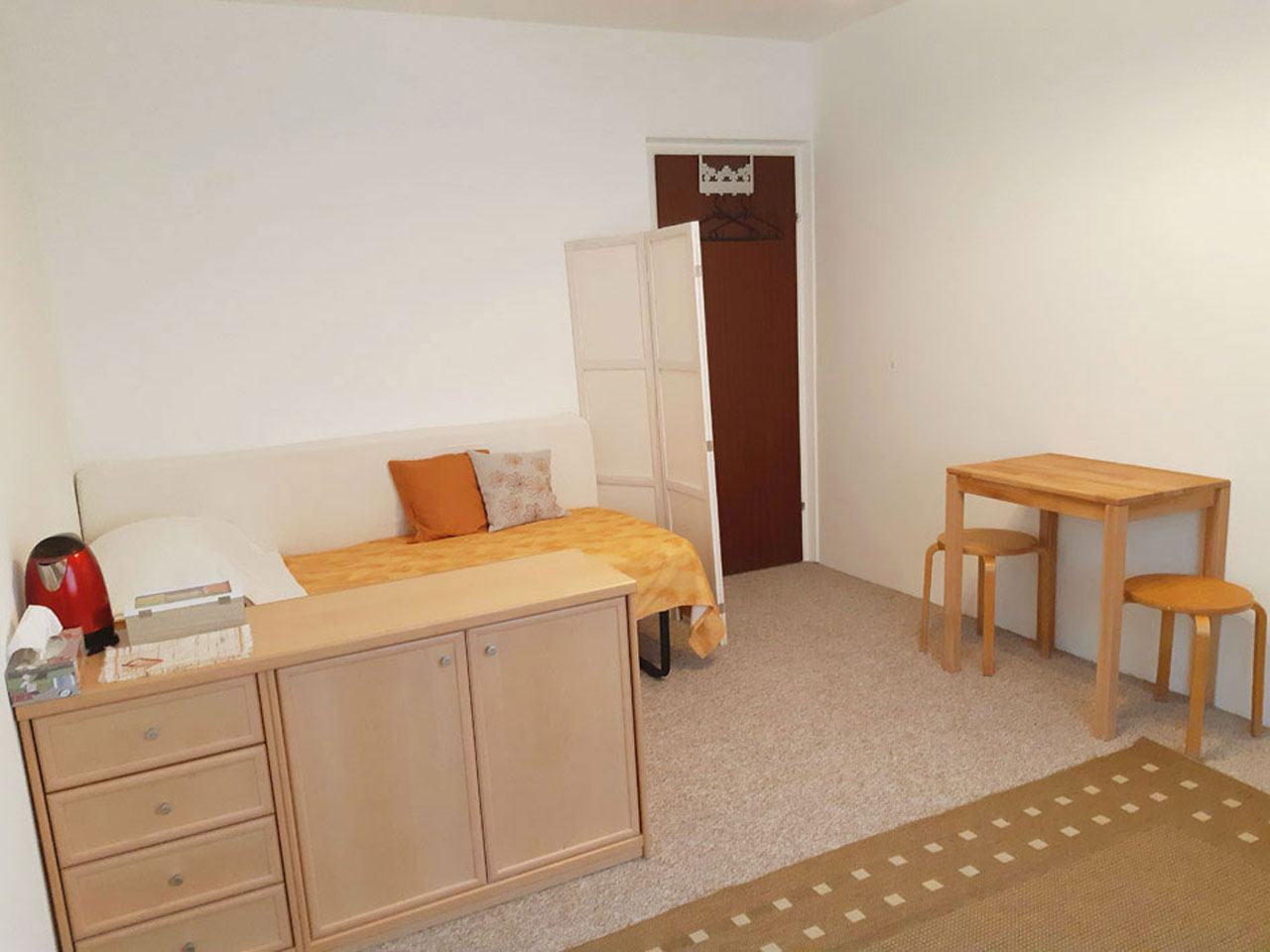- What have I received from a specific person?
- What have I given, what have I done for this person?
- What troubles and difficulties have I caused this person?
5-days Naikan Retreat in Vienna, Austria
You are welcome to extend the 5-days Naikan retreat. The classic Naikan week is a 7-days retreat. Longer retreats are also possible, e.g. a 10-days Naikan retreat.
Private Silence Retreat in Vienna, Austria
Naikan means looking inside to explore one's inner self. You go into silence to get deeply in touch with yourself. The three simple questions of Naikan will help you to look at yourself with new eyes. Find new perspectives and discover your inner resources.
A Naikan retreat is intense, you work on your experience with relationships and themes from morning till night, every day. Of course, you can take a break anytime. The Naikan instructor provides an external framework and personal guidance. How you use this outer framework is your personal decision.
What is offered
- Individual talks with instructor
(Choose the language: English, Français, Deutsch)- Naikan practices
- Singing bowl in the morning as a start into the day
- Personalized for one person
- Individual room, a practice area that is as undisturbed as possible
- 4 nights accommodation
- Daily meals (vegan or vegetarian) and beverages
Individual retreat for 1 person only, no group setting.
For all levels: beginner, intermediate, advanced.Location
The retreat will take place in the south part of Vienna, Austria. It's easy to reach, the subway station "Siebenhirten" is around the corner. Although located in the city, it is quiet with trees in front of the windows.
You will stay in a private room in an apartment. There is one single room for one person attending a retreat, and no group activities. The other room is occupied by your host and instructor. The bathroom and toilet are shared. Your room is bright and quiet.
Please note: There is construction work going on outside, the house façade is being renovated. As a result, there may be noise during the week.
Costs
5-days Naikan Retreat in Vienna, Austria
Fee: 590 Euro including board and lodging if you stay at the Naikan Location
Optional: You would like to practice Naikan for more than 5 days? You are welcome! 1 to 2 additional days of Naikan practice are possible in any case. Please contact me if you are interested. - Cost per additional day: Euro 100,- (in Vienna including board and lodging if you stay at the Naikan Location)
Optional: You are welcome to book 1 to 2 nights (without Naikan practice) after the retreat. Please contact me if you are interested. - Cost per additional night incl. breakfast: Euro 25,-
Withdraw and be in silence
Ideally, attending a Naikan retreat you withdraw and you are in silence so that you can practice Naikan as undisturbed as possible during the entire duration of the retreat, i.e., concentrate on your introspection and not be distracted by the outside world.
Therefore we provide an individual room, a practice area that is as undisturbed as possible and meals and beverages for the Naikan retreat.



We recommend during the retreat:
- No communication with others. It is best to inform family and friends before the retreat that you will not be available for the duration of the retreat − if it’s not possible for you to completely withdraw, we recommend setting a certain time window per day where you can be reached by the outside world
- No media distractions (no use of cell phones and/or computers, no reading)
During the retreat there is all-round care from the very first to the very last day. At an on-site retreat, your instructor, as the Naikan guide, is responsible for the setting (daily structure, meals, avoiding media, undisturbed withdrawal, etc.); so, you don't have to worry about that at all. Being cared for and knowing that the “Naikan reception” is manned around the clock creates a feeling of security in the sense of comfort.
Sample itinerary
Start: At the beginning, the instructor gives an introduction, explaining the setting and the Naikan method.
Naikan practice: After the introduction, the Naikan practice starts. Naikan is an individual self-reflection, there are no group activities. You are in your individual room and practice Naikan quietly. The instructor visits you for a short conversation (about 10-20 minutes each) every 60 to 90 minutes. If possible, there are no contacts to people outside the retreat. Meals and drinks are provided.
End: The instructor gives additional information in a final conversation at the end of the retreat.
Day 1
- 13:00 Check-in, lunch
- 14:00 Conversation and introduction, explaining the setting and the Naikan method
- 15:30 Start of Naikan practice: You work independently with Naikan in silence
- 17:00 1st individual talk, followed by Naikan practice
- 18:00 Dinner (meal is brought to your room)
- 18:30 2nd individual talk, followed by Naikan practice
- 20:00 3rd individual talk, followed by Naikan practice
- 21:30 4th individual talk
- 22:00 End of the Naikan day
Day 2, 3, 4
- 07:00 Singing bowl signals start of the day
- 07:30 Breakfast (meal is brought to your room)
- 08:00 Start of Naikan practice: You work independently with Naikan in silence
- 09:00 1st individual talk, followed by Naikan practice
- 10:30 2nd individual talk, followed by Naikan practice
- 12:00 3rd individual talk, followed by Naikan practice
- 13:00 Lunch (meal is brought to your room)
- 14:00 4th individual talk, followed by Naikan practice
- 15:30 5th individual talk, followed by Naikan practice
- 17:00 6th individual talk, followed by Naikan practice
- 18:00 Dinner (meal is brought to your room)
- 18:30 7th individual talk, followed by Naikan practice
- 20:00 8th individual talk, followed by Naikan practice
- 21:30 9th individual talk
- 22:00 End of the Naikan day
Day 5
- 07:00 Singing bowl signals start of the day
- 07:30 Breakfast (meal is brought to your room)
- 08:00 Start of Naikan practice: You work independently with Naikan in silence
- 09:00 1st individual talk, followed by Naikan practice
- 10:30 2nd individual talk, followed by Naikan practice
- 12:00 3rd individual talk, followed by Naikan practice
- 13:00 Lunch (meal is brought to your room)
- 14:00 4th individual talk, followed by Naikan practice
- 15:30 5th individual talk
- 16:00 Final conversation in a relaxed setting
- 17:00 End of retreat, check-out
Since it is an individual retreat, (no group activity), you can discuss the daily schedule together and adapt it to your personal needs. If you want to start later in the morning or stop later in the evening, that's no problem.
If you wish to integrate other forms of practice, please let me know. It is not necessary to interrupt your daily practice (e.g. yoga or meditation) during the retreat.
Optional: You would like to practice Naikan for more than 5 days? You are welcome! 1 to 2 additional days of Naikan practice are possible in any case. Please contact me if you are interested.
Optional: You are welcome to book 1 to 2 nights (without Naikan practice) after the retreat. Please contact me if you are interested.
Is prior knowledge or experience required?
No. The Naikan practice requires your willingness and ability to spend a lot of time alone, devoting yourself to your memories and introspection. You address your own life story and thereby focus on one caregiver or one topic. You allocate the memories to the 3 Naikan questions. The 3 Naikan questions are the methodical tools:
1. What has [person X] done for you? What have you received?
2. What have you done for [person X]? What have you given?
3. What difficulties have you caused [person X]?The Naikan conversations give your day a certain structure. As a Naikan guide, I support you, above all, through active listening. Anything that comes up or shows up, is allowed.
Do you already have some experience with meditation or longer silent seminars?
If you meditate or have taken part in a silent seminar spanning over a few days (e.g. mindfulness practice, Zen, Vipassana, fasting week, spiritual exercises...), then you’ve already experienced the fact that thoughts and feelings come and go, that life can sometimes get boring, that the mind wanders... you will experience the same thing with Naikan. Then just bring your focus back to the Naikan exercise.
Meditation (e.g. breathing exercises, Zen, Vipassana, MBSR, body journeys...) is often associated with holding a certain posture. This is different with Naikan: there is no prescribed posture that you need to hold. You can sit, lie, stand, move. Anything that helps your Naikan work is fine.
The goal of meditation is to learn to observe one’s own mind and then to direct the thoughts. To this end, Naikan opts for the path of controlling one's own mind by specifying clear time frames in which memories are called up and sorted out using the three Naikan questions as the primary tool. In Naikan, the mind isn’t supposed to be emptied, but the abundance of thoughts and feelings should be perceived and directed differently than before.
Do you already have some experience with psychotherapy or coaching?
If you have experience with psychotherapy or coaching, you already know that your past and your personal experiences are very valuable. Naikan is different to coaching and many therapeutic approaches in that it is not problem- or solution-oriented. In Naikan, it’s about the wealth of experiences. Whether joyful or sad or neutral, everything that you’ve experienced forms the foundation of who you are today.
If you’ve worked with associative methods in therapy or coaching, during which you have been able to recognize links between different events or times or people, you will learn a completely different approach with Naikan. Naikan is chronological biographical work. You follow your own life path and focus on one person (or topic); one person (or topic) at a time.
Coaching and countless psychotherapy methods use the conversation to question, analyze, and explore links together. It's different with Naikan. The primary task of the Naikan guide is to listen attentively during the Naikan conversation. The guide does not comment on what has been said, it is not discussed or analyzed. The perspective that you gain from your answers to the three Naikan questions, is alright.
Please note: The prerequisite for partaking in a Naikan retreat is in any case that you have clear cognitive abilities. Naikan is not a substitute for medical or psychological care.
In the case of health restrictions (e.g. taking medication or psychoactive substances that impair perception and concentration, or other physical or psychological restrictions that require special consideration), please have a preliminary discussion about it with the Naikan guide.

